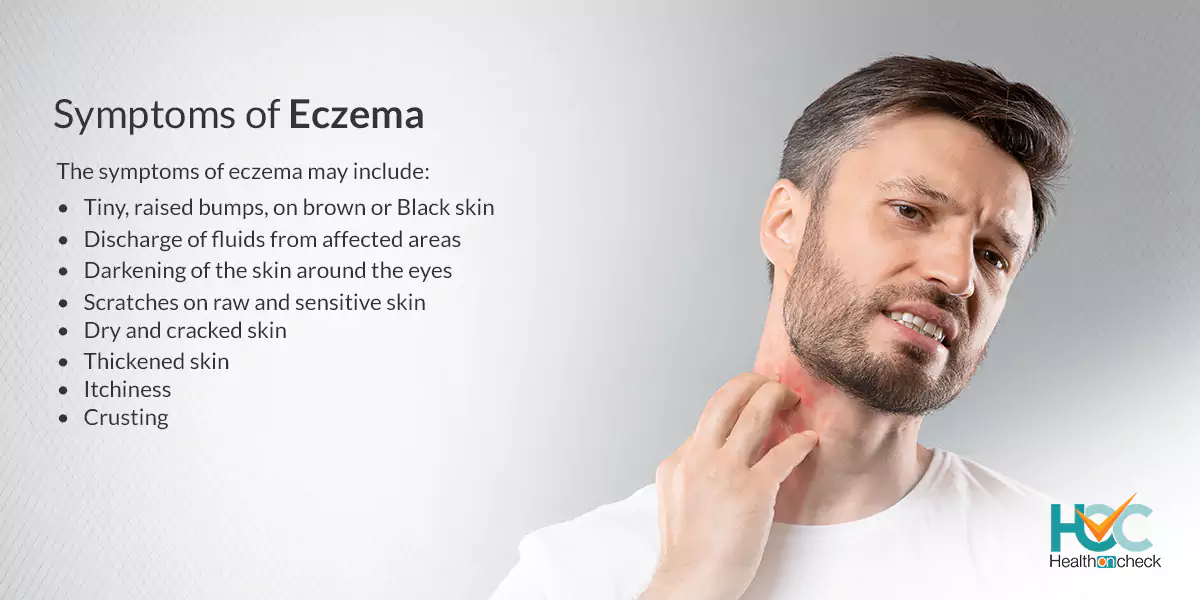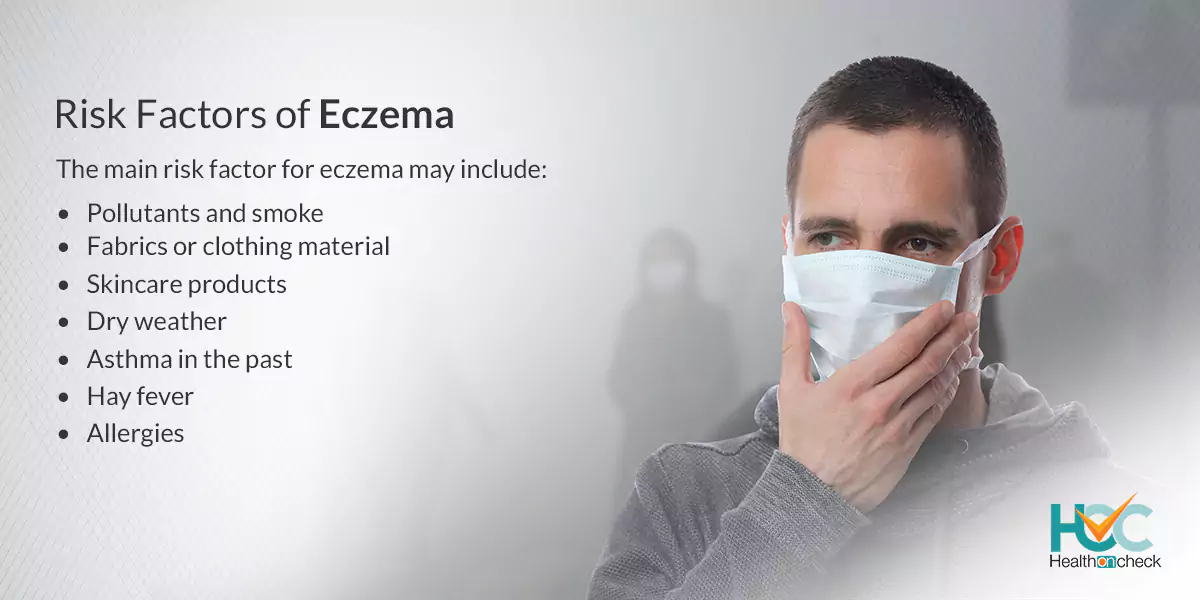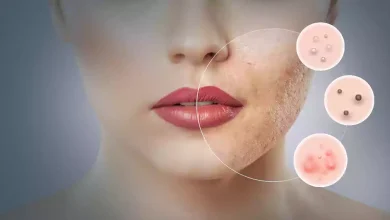All about Eczema

What is Eczema?
Eczema is a skin disorder that causes itchy, bumpy, dry, and inflamed skin and it’s quite common among young children but can arise at any age. This condition weakens the skin’s barrier function which helps the skin to retain moisture along with protecting the body from outside elements. Eczema falls under the category of dermatitis which is a group of skin disorders that cause skin inflammation. People with this condition have a high chance of developing other disorders such as hay fever, allergies, and asthma. Some types of eczema can cause blisters.
What are the Types of Eczema?
There are various types of eczema and each type has unique trigger points that can adversely affect the skin’s barrier function. The types of eczema include:
– Atopic dermatitis: Atopic dermatitis is a condition that causes skin discolouration and rashes that are itchy. It generally develops during childhood but the flare-ups can continue till adulthood. This condition cannot be cured but the symptoms can be managed through proper care. Atopic dermatitis is a common skin disorder and it approximately affects 1 out of every 10 babies/young children and around two-thirds of those affected get flare-ups till adulthood.
– Contact dermatitis: Contact dermatitis is an allergic or irritant reaction leading to a painful or itchy skin rash. You can get this condition if you come in contact with an allergen such as poison ivy) or an irritant such as certain chemicals. If your skin is sensitive or has other chronic skin problems like atopic dermatitis then your risk of developing contact dermatitis increases.
– Dyshidrotic eczema: Dyshidrotic eczema is a chronic (long-term) skin condition where the skin develops small blisters and dry, itchy skin. It generally occurs on your fingers, hands, and feet. Though it can affect anyone but nearly 50% of dyshidrotic eczema cases happen in people who are allergic to antigens.
– Neurodermatitis: Neurodermatitis is also called lichen simplex chronicus and is a non-life-threatening skin condition that causes itching and scratching, normally on only one or two skin patches of skin. Though it can appear on any part of your body but it appears mostly on the arms, shoulders, elbows, legs, ankles, wrists, hands, back of the neck, or scalp
– Nummular eczema: Nummular eczema is a skin condition where the skin develops circular, raised spots. The patches that appear are coin-shaped and the lesions are often itchy, and at times discharge clear fluid that may become crusty on top. It is a chronic condition and the patches can last for weeks to months, and flare-ups or episodes can frequently occur over a long period of time.
– Seborrheic dermatitis: Seborrheic dermatitis is a recurrent, non-communicable, easy-to-manage skin condition that causes itchy red patches and greasy scales on your skin and white or yellow crusty or powdery flakes on your scalp.

What are the Symptoms of Eczema?
The symptoms of eczema may include:
– Dry and cracked skin
– Itchiness
– Skin with a rash on swollen that differs in colour based on your skin color
– Tiny, raised bumps, on brown or Black skin
– Discharge of fluids from affected areas
– Crusting
– Thickened skin
– Darkening of the skin around the eyes
– Scratches on raw and sensitive skin
What are the Causes of Eczema?
Eczema may have a related gene variation that affects the skin’s capability to provide defence in some people. Because of the barrier function being weak, the skin is less capable of retaining moisture and shielding against bacteria, irritants, allergens, and environmental factors like smoking tobacco.
In a few others, eczema is developed because of too much of the bacteria Staphylococcus aureus on the skin. This replaces helpful bacteria and deranges the barrier function of the skin.
A skin barrier function that is weak might also set up an immune system response that results in inflamed skin and other complications.
The factors that may cause eczema include:
– Immune system: In the case you are suffering from eczema, your immune system reacts exaggeratedly to minor irritants or allergens (also known as triggers). When you get in contact with a trigger, your immune system believes that these small irritants are foreign invaders, such as bacteria or viruses, that are harmful and thus the triggers actuate your body’s natural defense system causing inflammation. Inflammation leads to the occurrence of eczema on your skin.
– Genes: If your family has a history of eczema, asthma, hay fever, and/or allergies or dermatitis in your family then you’re also at a higher risk of developing eczema.
– Environment: There are lots of environmental factors such as exposure to smoke, air pollutants, harsh soaps, fabrics such as wool, and some skin care products that can irritate your skin and cause eczema in your skin. Some other factors like low humidity (dry air) heat and high humidity can make your skin sweat, dry and itchy and make things worse.
– Emotional triggers: Your mental health sometimes affects your skin, which can cause an outburst of eczema symptoms. Other factors like high levels of stress, anxiety, or depression, may lead to more frequent outbursts of eczema

What are the Risk factors of Eczema?
The main risk factor for eczema may include:
– Allergies
– Hay fever
– Asthma in the past
– Family members with these conditions also increase your risk.
– Dry weather
– Fabrics or clothing material.
– Skincare products.
– Pollutants and smoke.
– Soaps, detergents, and certain chemicals you are exposed to.
– Your mental health and stress are also linked with eczema
What are the Complications of Eczema?
Complications of atopic eczema may include:
– Asthma and hay fever: If you have eczema then there are chances that you may suffer from asthma and hay fever also. This can occur before or after developing eczema.
– Food allergies: If you have eczema then you may develop food allergies. One of the chief symptoms of this condition is hives (urticaria).
– Neurodermatitis: When you scratch the affected area, it gives only temporary relief but can actually worsen the condition as scratching in fact makes the skin itchier as it initiates the nerve fibers in your skin. Gradually, scratching becomes a habit and makes affected skin discoloured, thick, and leathery. Long-term itchy and scaly skin can cause a skin condition called neurodermatitis (lichen simplex chronicus) that begins with a patch of itchy skin. Neurodermatitis is a skin condition specified by immedicable itching or scaling. In neurodermatitis you will notice raised, rough, itchy areas of skin — usually on the neck, wrists, forearms, legs, or groin area.
– Patches of skin that’s darker or lighter than the surrounding area: This complication occurs after healing of the rash has healed and is known as post-inflammatory hyperpigmentation or hypopigmentation. It’s more recurrent among people with brown or black skin. It may take many months for the discolouration to go away.
– Skin infections: Skin infections from bacteria and viruses are one of the main complications of eczema that occurs because of repeated scratching that breaks the skin and results in open sores and cracks. At times these skin infections can spread and become serious even fatal.
– Irritant hand dermatitis: This particularly affects people whose works include wet hands and who are exposed to rough soaps, detergents, and disinfectant.
– Allergic contact dermatitis: Allergic contact dermatitis is a complication where an itchy rash is caused by getting in contact with things you’re allergic to. The colour of the rash differs based on your skin color.
– Sleep problems: Because of constant itchiness, you may find problems in or while sleeping.
– Mental health issues: Eczema is often linked with depression and anxiety. This may be because of continuous itching and sleep problems which are common among people with eczema.
How Eczema is Diagnosed?
Your dermatologist can diagnose the problem by talking with you about your symptoms, checking your skin, and analyzing your medical history. You may have to go through some tests including blood tests, allergy tests, and skin biopsy to identify your condition and distinguish one type of dermatitis from another.
Patch testing is a common test to diagnose eczema where small amounts of distinct substances are put into your skin and then covered and over the next few days, the dermatologist will check your skin for signs of some reactions. Patch testing helps to diagnose certain kinds types of allergies that may be causing eczema in your skin.
What are the Treatment Options Available for Eczema?
The goal of treating eczema is to ease and prevent itching, which can result in infections that can be severe and sometimes life-threatening also. The treatment of eczema is based on many factors such as what is causing your symptoms to flare up and varies from person to person. Treatment options for eczema may include:
– Gentle or sensitive skin moisturizers are prescribed to use all through the day when you have dry skin. Applying moisturizer when your skin is damp after a bath or shower is effective to prevent dermatitis.
– Your dermatologist may advise you to apply topical steroids/ medications on the affected areas of your skin as they are helpful to ease the symptoms.
– Oral medications such as anti-inflammatory medicines, antihistamines, or corticosteroids are quite effective sometimes to decrease itchiness and swelling.
– Immune system functions can be regulated through Immunosuppressant drugs. Topical calcineurin inhibitors are also prescribed which help to suppress the activities of the immune system. It reduces inflammation and helps prevent flares.
– In some cases, your dermatologist may ask you to go for light therapy which is helpful to improve the sight of your skin along with removing blemishes.
– You have to take utmost precautions to avoid triggers that result in symptoms of eczema flaring up.
– Hydrocortisone creams and antihistamines
– Nonprescription medicinal products such as hydrocortisone cream and antihistamines are helpful to reduce redness, itching, and swelling of the skin.
– Antibiotics: Antibiotics are given by doctors in cases where there is bacterial skin infection along with eczema.
– Phototherapy: Here the affected areas are exposed to UVA or UVB waves. This method is used to treat moderate dermatitis. A specialized doctor will observe the skin closely throughout the treatment.
– Injecting biological drugs: Medications block proteins are injected into the body to limit the response of the immune system.
Living with Eczema
Eczema can affect your emotional, social, and personal welfare. It can affect your family life, personal and social relationships adversely. Developing eczema may make you anxious, embarrassed, or less confident along with being angry, frustrated, or depressed. There is no definitive solution to cope with these issues and everyone deals with them in different ways. To cope with this problem, the most important thing is staying positive and knowing that this condition can be treated with proper guidance, some self-care, life-style changes, and adequate treatment. Share your feelings with your close friends and family members.
Whom to Consult?
If you notice symptoms of eczema, immediately consult your doctor who will recommend you to a dermatologist who is specialized in treating skin-related disorders. The dermatologist will examine your condition and check whether it’s eczema or some other skin condition and start treatment accordingly.




